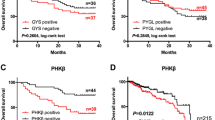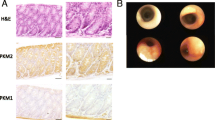Abstract
PURPOSE: We have previously reported decreased protein kinase C (PKC) enzyme activity in primary human colorectal carcinomas. The purpose of this study was to extend these findings to a larger number of cases and to also examine the levels of expression of mRNAs that encode specific isoforms of PKC in these tumors. METHODS: Colorectal carcinomas and paired grossly normal adjacent mucosal samples were collected from 39 patients. Complete histopathologic analyses were performed on all samples. PKC enzyme activity in both the cytosolic and particulate fractions was quantitated by measuring the amount of 32 P incorporated into histone Type III-S. Northern blot nucleic acid hybridization was performed using polyA + RNA extracted from both the tumor and normal tissue samples and 32 P-labeled probes for specific isoforms of PKC. The paired sample t-test was used to determine the statistical significance of tumor to normal ratios of both enzyme activity and mRNA levels. RESULTS: The mean value for cellular PKC enzyme activity in the colon tumors from 39 patients was about 60 percent of that found in the paired adjacent grossly normal mucosa samples (P<0.001). The subcellular distribution of PKC activity was similar in normal and tumor samples (about 70 percent in the particulate fraction). The abundance of PKCα mRNAs varied considerably among 28 tumor/normal pairs, with a mean tumor to normal (T∶N) ratio of 1.0±0.6 for the 99-kb mRNA band and 1.4±0.7 for the 3.5-kb band. The abundance of PKCβ mRNAs was decreased in 30 of 39 tumors, with a mean T∶N ratio of 0.6±0.4 for both the 94- and 3.5-kb bands for all 39 samples (P<0.001). None of the parameters measured correlated with Dukes stage or the grade of the tumor. CONCLUSIONS: These studies extend previous evidence that total PKC enzyme activity is frequently decreased in primary human colon tumors. Our finding that this is often associated with decreased levels of PKC β mRNA suggest that this is not simply due to posttranslational down-regulation of this enzyme system. Further studies are required to determine whether these changes in PKC α and PKC β mRNAs are due to altered de novo transcription or mRNA stability. It will also be of interest to examine the expression of other isoforms of PKC in colon tumors.
Similar content being viewed by others
References
Guillem JG, Weinstein IB. The role of PKC in colon neoplasia. In: Herrera L, ed. Familial adenomatous polyposis. New York: AR Liss, 1990:325–32.
Fearon ER, Vogelstein B. A genetic model for colorectal tumorigenesis. Cell 1990;61:759–67.
Kinzler KW, Nilbert MC, Su LK,et al. Identification of FAP locus genes from chromosome 5q21. Science 1991;253:661–5.
Doll R, Peto R. The causes of cancer: quantitative estimates of avoidable risks of cancer in the United States today. J Natl Cancer Inst 1991;66:1191–1308.
Reddy BS, Weisburger JH, Wynder EL. Effect of dietary fat level and dimethylhydrazine on fecal acid and neutral sterol excretion and colon carcinogenesis in rats. J Natl Cancer Inst 1974;52:507–11.
Weinstein IB. The role of protein kinase C in growth control and the concept of carcinogenesis as a progressive disorder in signal transduction. In: Nishizuka Y, Endo M, Tanaka C, eds. The biology and medicine of signal transduction. New York: Raven Press, 1990:307–16.
Weinstein IB, Borner CM, Krauss RS,et al. Pleiotropic effects of protein kinase C and the concept of carcinogenesis as a progressive disorder in signal transduction. In: Brugge J, Curran T, Harlow, McCormick F, eds. Origins of human cancer: a comprehensive review. Plainview; Cold Spring Harbor Laboratory Press, 1991:113–24.
Nishizuka Y. Intracellular signaling by hydrolysis of phospholipids and activation of protein kinase C. Science 1992;258:607–14.
Bell RM, Burns DJ. Lipid activation of protein kinase C. J Biol Chem 1991;266:4661–4.
Osada S, Mizuno K, Saido T,et al. A phorbol ester receptor/protein kinase, nPKCη, a new member of the PKC family predominantly expressed in lung and skin. J Biol Chem 1990;265:22434–40.
Bacher N, Zisman Y, Berent E, Livneh E. Isolation and characterization of PKC-L, a new member of the protein kinase C-related gene family specifically expressed in lung, skin, and heart. Mol Cell Biol 1991;11:126–33.
Ohno S, Kawasaki H, Imajeh T,et al. Tissue specific expression of three distinct types of rabbit protein kinase C. Nature 1987;325:161–6.
Coussens L, Parker PJ, Rhee L,et al. Multiple distinct forms of bovine and human protein kinase C suggest diversity in cellular signaling pathways. Science 1986;233:859–66.
Kikawa U, Kishimoto A, Nishizuka Y. The protein kinase C family: heterogeneity and its implications. Annu Rev Biochem 1989;58:31–44.
Guillem JG, O'Brian CA, Fitzer CJ,et al. Altered levels of protein kinase C and Ca2+-dependent protein kinases in human colon carcinomas. Cancer Res 1987;47:2036–9.
Kopp R, Noelke B, Sauter G, Schildberg FW, Paumgartner G, Pfeiffer A. Altered protein kinase C activity in biopsies of human colon adenomas and carcinomas. Cancer Res 1991;51:205–10.
Kusunoki M, Sakanoue Y, Hatada T, Yanagi H, Yamamura T, Utsunomiya J. Protein kinase C activity in human colon adenoma and colorectal carcomina. Cancer 1992;69:24–30.
Baum CL, Wali RK, Sitrin MD, Bolt MJG, Brasitus TA. 1,2- Dimethylhydrazine-induced alterations in protein kinase C activity in the rat preneoplastic colon. Cancer Res 1990;50:3915–20.
Dukes CE. Cancer of the rectum: An analysis of 1000 cases. J Pathol Bacteriol 1940;50:527–39.
Guillem JG, Levy MF, Hsieh LL,et al. Increased levels of phorbin, c-myc, and ornithine decarboxylase RNAs in human colon cancer. Mol Carcinog 1990;3:68–74.
Parker PJ, Coussens L, Totty N,et al. The complete primary structure of protein kinase C- the major phorbol ester receptor. Science 1986;233:853–9.
Suggs SV, Wallace HB, Hirose T, Kawashima EH, Itakura K. Use of synthetic oligonucleotides as hybridization probes: isolation of cloned cDNA sequences for humanβ 2-macroglobulin. Proc Natl Acad Sci USA 1981;78:6613–7.
Wali RK, Baum CL, Bolt MJ, Dudeja PK, Sitrin MD, Brasitus TA. Downregulation of protein kinase C activity in 1,2-dimethylhydrazine-induced rat colonic tumors. Biochim Biophys Acta 1991;1092: 119–23.
Borner C, Nichols GS, Hsieh L-L, Hsiao W-L, Weinstein IB. Transformation by a ras oncogene causes increased expression of protein kinase C-α and decreased expression of protein kinase C-∈. Cell Growth Differ 1990;1:653–60.
Borner C, Nichols GS, Hsiao WW, Fabbro D, Barr M, Weinstein IB. Expression of four protein kinase C isoforms in rat fibroblasts. II. Differential alterations inras-, src- andfos-transformed cells. J Biol Chem 1992;267:12900–10.
Phan SC, Morotomi M, Guillem JG, LoGerfo P, Wein-stein IB. Decreased levels of 1,2-sn-diacylglycerol in human colon tumors. Cancer Res 1991;51:1571–3.
Sauter G, Nerlich A, Spengler U, Kopp R, Pfeiffer A. Low diacylglycerol values in colonic adenomas and colorectal cancer. Gut 1990;31:1041–5.
Choi P, Tchou-Wong K-M, Weinstein IB. Overexpression of protein kinase C in HT29 colon cancer cells causes growth inhibition and tumor suppression. Mol Cell Biol 1990;10:4650–7.
Fitzer CJ, O'Brian CA, Guillem JG, Weinstein IB. The regulation of protein kinase C by chenodeoxycholate, deoxycholate and several structurally related bile acids. Carcinogenesis 1987;8:217–20.
Guillem JG, O'Brian CA, Fitzer CJ,et al. Studies on protein kinase C and colon carcinogenesis. Arch Surg 1987;122:1475–8.
Morotomi M, Guillem JG, LoGerfo P, Weinstein IB. Production of diacylglycerol, an activator of protein kinase C, by human intestinal microflora. Cancer Res 1990;50:3595–9.
Author information
Authors and Affiliations
Additional information
This research was supported by NCI Grant CA 02656, an American Cancer Society Award (Sig 13), and an award from the Lucille Markey Charitable Trust to I. Bernard Weinstein.
About this article
Cite this article
Levy, M.F., Pocsidio, J., Guillem, J.G. et al. Decreased levels of protein kinase C enzyme activity and protein kinase C mRNA in primary colon tumors. Dis Colon Rectum 36, 913–921 (1993). https://doi.org/10.1007/BF02050625
Issue Date:
DOI: https://doi.org/10.1007/BF02050625




